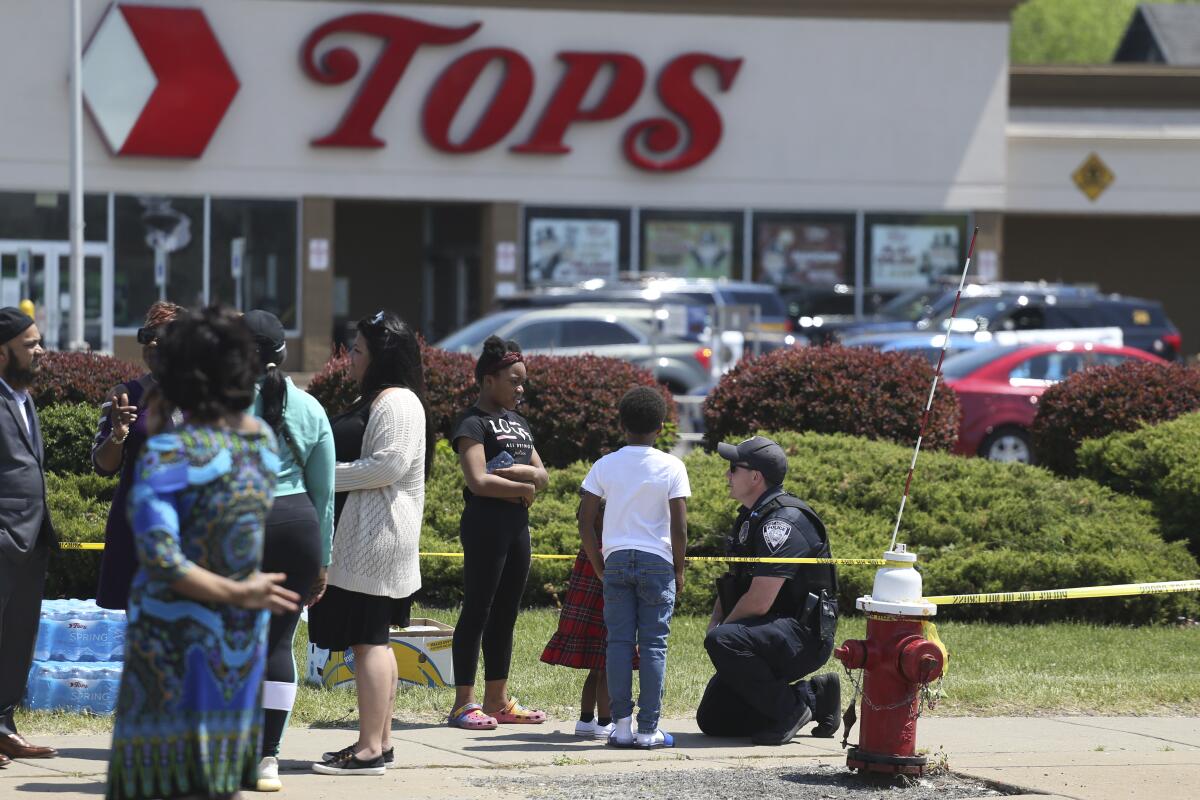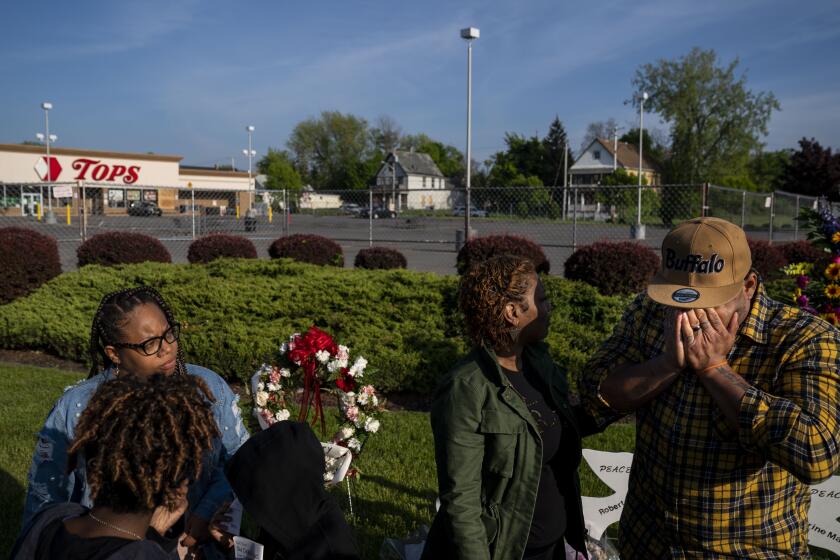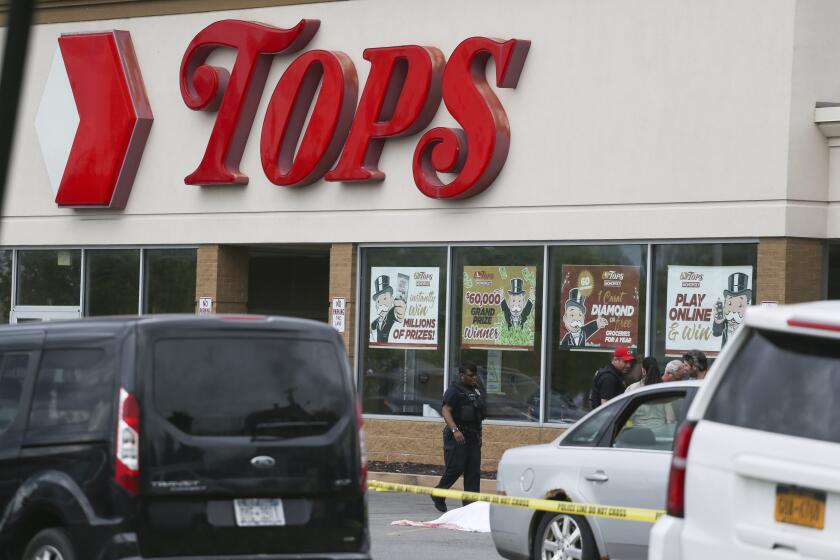White supremacist gets life without parole for killings of 10 Black people at Buffalo market

- Share via
BUFFALO, N.Y. — A white supremacist who killed 10 Black people at a Buffalo supermarket was sentenced to life in prison without parole Wednesday after listening to relatives of his victims express the pain and rage caused by his racist attack.
The sentencing hearing for Payton Gendron was disrupted briefly when he was charged by a man in the audience, who was quickly restrained. It resumed after about 10 minutes, with more emotional testimony from people who talked about losing loved ones in the attack.
Gendron, whose hatred was fueled by racist conspiracy theories he encountered online, cried during some of the testimony and apologized to victims in a brief statement. The judge imposed separate sentences of life without parole, one for each victim, to run concurrently. She also denied Gendron youthful-offender status — he was 18 at the time of the attack — which might have given him a chance to reenter society.
“There was nothing hasty or thoughtless about your conduct. There are no mitigating factors to be considered,” Judge Susan Eagan said.
Gendron pleaded guilty in November to crimes including murder and domestic terrorism motivated by hate, a charge that carried an automatic life sentence.
Gendron, now 19, wore bullet-resistant armor and a helmet equipped with a livestreaming camera as he carried out the May 14 attack with a semiautomatic rifle he purchased legally but modified so he could load it with illegal high-capacity ammunition magazines.
Research has found that mental health can decline significantly, not only among those who witness or lose loved ones in mass shootings, but also among people who share elements of their identity. Buffalo is a stark reminder.
Gendron also faces separate federal charges that could carry a death sentence if the U.S. Justice Department chooses to seek it. His defense attorney said in December that Gendron is prepared to plead guilty in federal court as well to avoid execution.
The sentencing resumed shortly after the disruption, which happened as Barbara Massey Mapps excoriated him for killing her 72-year-old sister, Katherine Massey. As Mapps shouted and pointed at Gendron, a man in the audience took a few steps toward him before being held back.
“You don’t know what we’re going through,” the man shouted as he was led away by court officers. For several minutes thereafter, family members hugged and calmed one another.
Eagan ordered Gendron back in and let the proceeding resume after admonishing everyone to “conduct ourselves appropriately.”
“I understand that emotion, and I understand the anger, but we cannot have that in the courtroom,” she said.
The sentencing hearing was a chance for loved ones of the dead, as well as people wounded in the attack last spring, to pour out their loss, anguish and ire.
Some, like Mapps, angrily condemned Gendron; others quoted from the Bible or said they were praying for him. Several condemned him for his deliberate attack on a Black community far from his nearly all-white hometown.
“You’ve been brainwashed,” Wayne Jones Sr., the only child of victim Celestine Chaney, said as sobs rose from the audience. “You don’t even know Black people that much to hate them. You learned this on the internet, and it was a big mistake.
“I hope you find it in your heart to apologize to these people, man. You did wrong for no reason,” Jones said.
Kimberly Salter, the widow of security guard Aaron Salter, explained that she and her family were wearing “red for the blood that he shed for his family and for his community, and black because we are still grieving.”
Christopher Braden, a Tops Friendly Market employee who was shot in the leg, said he was haunted by the sight of the victims lying on the ground as he was carried out of the store.
In the 1990s, Republicans spread fear over people of color “replacing” white people in California. It’s tenet of white supremacy we must confront.
“The visions haunt me in my sleep and every day,” he said.
At one point, Gendron began crying himself.
There were only three survivors after he shot 13 people, specifically seeking out Black shoppers and workers.
His victims at the Tops market included a church deacon, the grocery store’s guard, a neighborhood activist, a man shopping for a birthday cake, a grandmother of nine and the mother of a former Buffalo fire commissioner. The victims ranged in age from 32 to 86.
In documents posted online, Gendron said he hoped the attack would help preserve white power in the U.S. He wrote that he picked the Tops grocery store, about a three-hour drive from his home in Conklin, N.Y., because it was in a predominantly Black neighborhood.
The mass shooting in Buffalo, and another less than two weeks later that killed 19 students and two teachers at a Texas elementary school, amplified calls for stronger gun controls, including from victims’ relatives who traveled to Washington to testify before federal lawmakers.
New York legislators quickly passed a law banning semiautomatic rifle sales to most people under age 21. The state also banned sales of some types of body armor.
President Biden signed a compromise gun violence bill in June intended to toughen background checks, keep firearms from more domestic violence offenders and help states put in place “red flag” laws making it easier for authorities to take weapons from people deemed dangerous.
More to Read
Sign up for Essential California
The most important California stories and recommendations in your inbox every morning.
You may occasionally receive promotional content from the Los Angeles Times.















